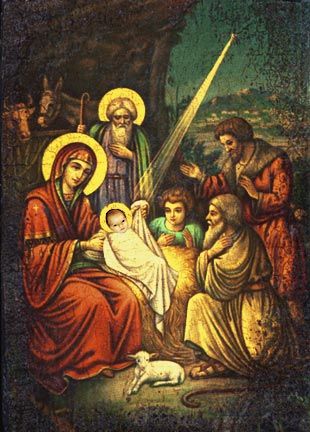For the next two weeks, please read through St. Leo’s Christmas sermon 26. As before, please ruminate over the sermon and allow it to give you a deeper and richer understanding of what we celebrate at Christmas. Also, pay attention to how St. Leo applies to the Nativity the same gospel themes that we see throughout the New Testament and particularly in St. Paul’s letters.
Section 1 – The Nativity and Acknowledgment of God
The first section of the sermon begins with the Incarnation. Of all the days of the year, Christmas is the time to arouse and focus the mind on the Incarnation. Christmas does not celebrate a little baby lying in a bucolic manger but celebrates “God, the Son of God, begotten of the co-eternal Father, [being] born by a human birth.” (1:1) The Child is God. St. Leo puts the audacity of this Christian claim front and center. The Old Testament refers to great teachers that are killed by the authorities, men coming back from the dead, or even those being assumed into heaven. But it is inconceivable and blasphemous in Judaism to think of God the Creator taking on created human flesh or in Greek philosophy that the Absolute One becoming a particularized human form. This, however, is the assertion that we make and that is the very foundation of our Christain faith. And Christmas is the time when we most boldly proclaim this most unusual of doctrines that “The Maker of the world . . . becomes the son of whom He created.” (1:4) The invisible and intangible Word of God, which sustains the universe, became our human substance and nature, in body and in soul. God became one of us, and therefore, we too sing: “Glory to God in Highest, and Peace on earth to those of good will.” (1:6)
Section II – We Participate in the Nativity
In section two of the sermon, St. Leo makes an even more audacious claim. Not only did God, the Son of God, the Word of God, become one of us and take upon himself our very nature, but we become like him and take upon ourselves his Divine nature through our direct participation in his Nativity. Paul tells us that God sent his Son into the world, born of a woman so that we might receive adoption as God’s Sons. (Gal. 4:1-7). Just as the second person of the Trinity is, so we become. The story of adoption reaches its climax in Jesus’s Passion and Resurrection, but the story begins at Christmas. “In adoring the birth of our Savior, we find that we are celebrating the commencement of our own life.” (2:1). The story of our salvation starts now. (This is why the Christian new year with a new lectionary begins in Advent.)
For St. Leo, Christmas and the Incarnation are not simply a historical event that happened in a land far away a long time ago. It is an event that actively and presently occurs in your life and throughout the Church here and now. “The entire faithful being born in the font of baptism, is crucified with Christ in his Passion, raised again in his Resurrection, and placed at the Father’s right hand in his Ascension – are born in this Nativity.” (2:3) You are re-born at Christmas. As Paul says, we are dead to sin and alive to God in Christ. (Rom 6:11) There is no better time to acknowledge and live into your re-birth than at Christmas. Jesus tells us that to receive the Kingdom, we are to become like a little child. (Mark 10:15). Become that little child at Christmas.
St. Leo ends this section with the same appeal to Abraham as Paul has in Romans 4. In living into our new birth, we need to follow the example of Abraham. God promised Abraham that he would be the father of many nations and that all nations would be blessed through him. This promise, of course, is fulfilled in Christ. Abraham believed these promises despite his adverse circumstances – he was old, he was a nomad, and his wife was barren. So too are we to believe as did Abraham even though we to may be overwhelmed with the shortcomings of this world. At Christmas, we should share in the faith of Abraham – “believe in God, and waver not through unbelief but know most assuredly that what the Lord has promised, he is able to perform.” (2:8). When we see the Christ-child lying in the manger, and contemplate the Incarnation, we know that God’s promises to us in Christ have, are, and will be fulfilled.
Through these things he has bestowed on us his precious and most magnificent promises, so that by means of what was promised you may become partakers of the divine nature, after escaping the worldly corruption that is produced by evil desire.
2 Peter 1:4

